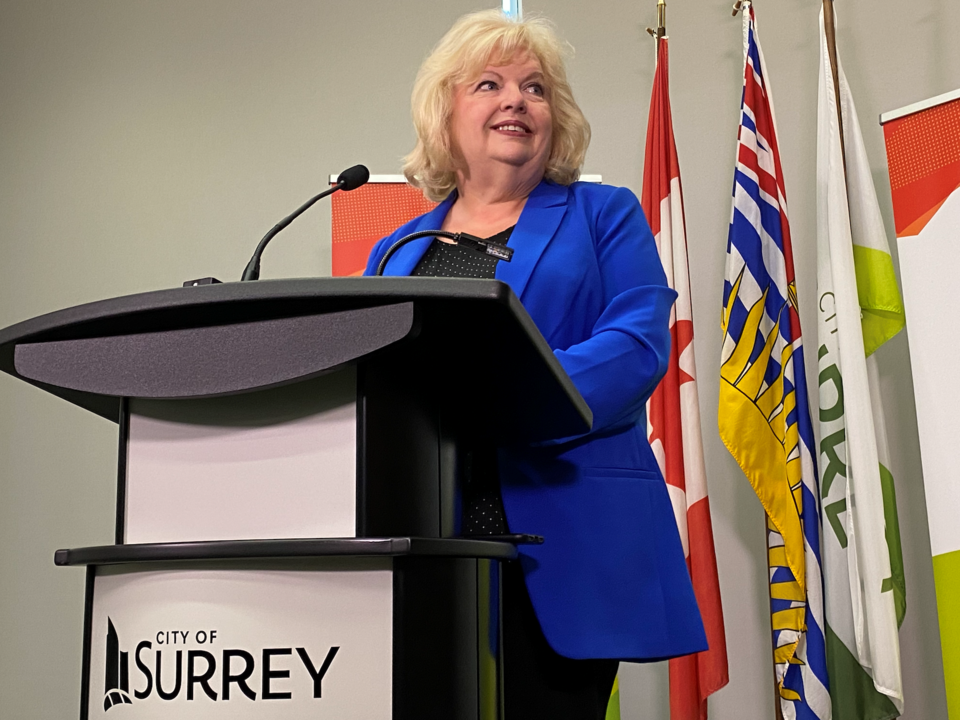Surrey Mayor Brenda Locke has launched a last-ditch, Hail Mary, attempt to stop the transition to a new municipal police force by taking the province to court. But she’ll face a steep uphill battle to convince a judge that the B.C. government lacks the authority to set the rules on policing in her city.
“Surrey simply cannot accept the extraordinary burden that our taxpayers will face as a result of a provincial order that will not deliver any public safety benefit,” Locke wrote Friday in a letter to Solicitor General Mike Farnworth alerting him to the court challenge.
The city argues Farnworth’s order in July to transition from the RCMP to the new Surrey Police Service will lead to a $464 million funding shortfall over the next 10 years, well above the $150 million Premier David Eby has offered in financial assistance.
The numbers, if they are to be believed (and both sides have their own sets of figures), will hold little weight in court.
The substance of the is that it does not believe the B.C. Police Act gives the Solicitor General the power to choose a police department for a municipality.
“The Police Act does not authorize the minister to impose on the city a police force that is not the police force selected by the city,” reads Surrey’s court filing.
The court petition goes on to make several other points about whether the city was properly served notice by the province, and whether the government’s director of police services did a comprehensive job in giving Farnworth the information needed to make a decision.
The B.C. government has yet to reply in court, but when it does, you can expect it to bring in a pretty strong case in defence.
B.C.’s Police Act gives Farnworth broad authority to do what he feels is necessary to ensure safe and adequate policing for the municipality. He’s always had this legislative hammer, even if the NDP government, for political reasons centered around the sensitivity of Surrey ridings, has downplayed this power in recent months.
The Police Act states clearly that the provincial cabinet “may make regulations to enhance, provide or reorganize policing and law enforcement in any or all areas of British Columbia, including, without limitation, in any or all municipalities.”
It seems far-fetched to believe, as Surrey does, that somehow the province wields all this authority to set safe and adequate policing and yet it can’t actually change a municipality’s police force unless the municipality agrees.
The city has also tried to mount a legal argument that the province failed to give it the adequate funding to change police departments — though the Police Act is again pretty clear that any provincial decisions to change local policing are “a debt due to and recoverable by the government from the municipality.”
There’s also an entire section of the Police Act that gives the Solicitor General sweeping power to “take other steps the minister considers necessary” if he feels a municipality has failed in its duties to select adequate policing.
To counter this, the City of Surrey argues in its legal documents that its municipal powers limit Farnworth’s ability to intervene.
“The community charter requires the provincial to respect municipal authority,” the city wrote.
That is flimsy, at best. Time and time again, the province has proven that municipalities are creatures of the B.C. government. It will be tough for Surrey to convince anyone differently.
Farnworth also has one last card to play in the dispute.
On Monday, he said he intends to introduce legislation to change the Police Act to prevent a municipality from switching police departments twice, as Surrey has done in recent years.
Within that legislation, expect a line that makes clear Surrey’s new police department is the Surrey Police Service, and not the RCMP. It will likely become another plank in the province’s court defence.
To backstop its case, the city is continuing its consulting contract with Peter German, a lawyer, former RCMP officer and one-time ally of the premier’s on money-laundering.
German was hired in November 2022 on a five-month contract worth $25,000, but it has been extended and grown since then.
“The issue is the jurisdiction of the minister to make the decision that he did,” German told reporters on Friday, as he justified the city decision publicly while Locke was nowhere to be seen.
“The City of Surrey obviously opposes that decision, and believes he did not have jurisdiction. But that’s for the court to decide.”
German is one of several consultants, on all sides, who stand to benefit financially the longer this policing dispute drags on.
Former RCMP commander Wayne Rideout, who once served as B.C.’s director of police services, has been retained by the Surrey Police Service at $175 per hour.
And the B.C. government hired Jessica McDonald, a former deputy minister to premier Gordon Campbell, to oversee the Surrey police transition at a cost of up to $500,000 over one year.
The province said Friday it expects to honour McDonald’s contract, even as the police transition she’s supposed to oversee gets tied up in court.
It’s not clear how long it will take B.C. Supreme Court to rule on Surrey’s court petition. But dragging this out seems to only benefit the billable hours of all the lawyers and consultants hired to fight this dispute, and certainly not the taxpayers of Surrey.
Rob Shaw has spent more than 15 years covering B.C. politics, now reporting for CHEK News and writing for Glacier Media. He is the co-author of the national bestselling book A Matter of Confidence, host of the weekly podcast Political Capital, and a regular guest on CBC Radio. [email protected]




